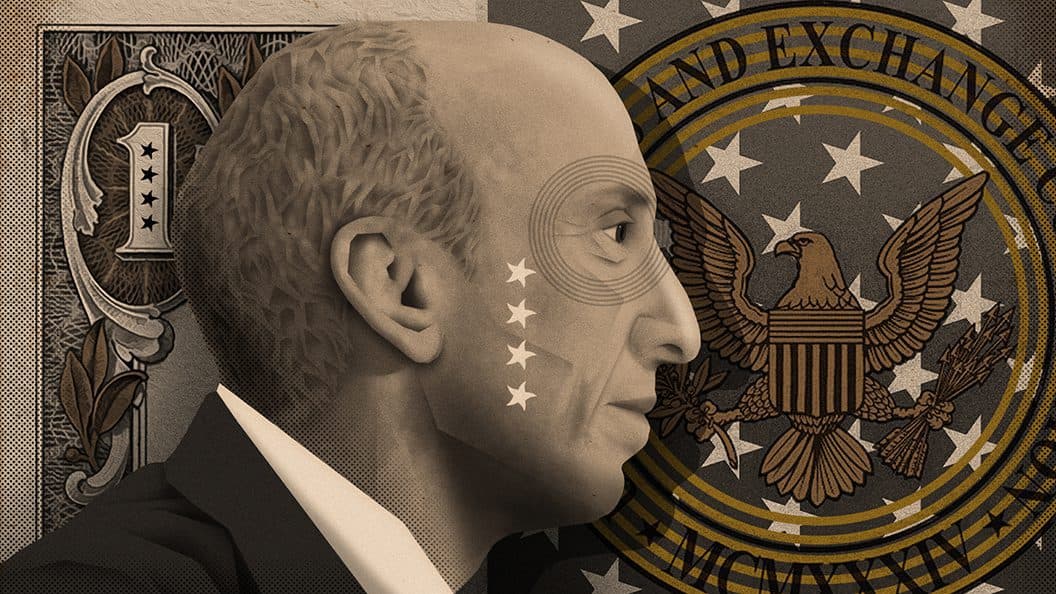SEC’s Gensler: Stablecoins Are Poker Chips
Gensler has doubts over the security and legitimacy of the assets, although he did acknowledge that the cryptocurrency industry has been able to influence broader finance.

Gary Gensler, Chairman, SEC; Blockworks exclusive art by Axel Rangel
- The SEC head has turned his attention to stablecoins, and signals a shift towards more intense scrutiny of the digital asset industry
- Federal Reserve Chairman Jerome Powell has said that stablecoins pose a threat and exist within an “underdeveloped regulatory framework.”
United States Securities and Exchange Commission Chairman Gary Gensler thinks digital assets have potential, but that does not make them immune to regulatory oversight, Wall Street’s top regulator explained during a Washington Post virtual event.
“I taught this and studied it for many years at MIT and I wouldn’t have dedicated my time to it if I didn’t think it was interesting and innovative,” Gensler said. “But, at the same time, I don’t think technologies last long outside of a social and public policy framework and in this case, we have to insure for investor and consumer protection.”
Prior to his position with the SEC, Gensler taught a blockchain course at the Massachusetts Institute of Technology and also served as a co-director of Fintech@CSAIL, a research group that investigates disruptive technologies. Many in the industry expected his education to lead to a favorable view of cryptocurrencies from a regulatory perspective, but his recent comments have indicated that he intends to increase oversight over the industry.
“I think there are innovations in that basic ‘white paper,’ so to speak, that Satoshi Nakamoto put out about a dozen years ago,” Gensler said. “But what we have now is an asset class that’s highly speculative, stored on a digital ledger and the value could go down dramatically, it could go up dramatically. In many cases, there is not something standing behind it other than what somebody else will pay you for it.”
The SEC head turned his attention to stablecoins, and he’s not the first US regulator to do so.
Federal Reserve Chairman Jerome Powell has said that stablecoins pose a threat and exist within an “underdeveloped regulatory framework.”
“These stablecoins are acting almost like poker chips at the casino right now,” Gensler said, saying the assets that claim to be backed by the US dollar may not be what they seem.
Stablecoin reserves have been called into question recently as it was revealed that most “cash reserves” are actually not kept in cash. Earlier this year, Tether revealed a breakdown of USDT reserves, of which only 2.6% are kept in cash. The remainder is a combination of secured loans, corporate bonds, crypto holdings and other investment vehicles. Centre Consortium, which includes Coinbase and Circle, recently revealed that all of the assets backing USDC, the world’s second largest stablecoin, will be moved into cash and short-term treasuries.
Gensler, however, still has doubts over the security and legitimacy of the assets, although he did acknowledge that the cryptocurrency industry has been able to influence broader finance.
“I do think this new technology is very interesting, and whoever Satoshi Nakamoto was, it’s led to real change,” he said. “It’s pushing at the side of central banks around the globe to reconsider how to provide payments systems, it’s pushing on the side as a catalyst for change in finance and fintech.”
Are you a UK or EU reader that can’t get enough investor-focused content on digital assets?Join us in London on November 15th and 16th for the Digital Asset Summit (DAS) London. Use code ARTICLE for £75 off your ticket. Buy it now.






